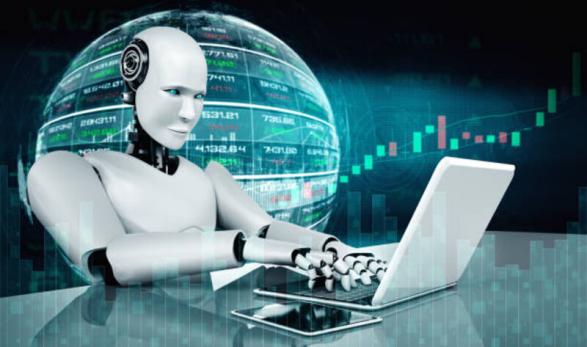The Role of AI in Boosting Stock Market Performance
Dec 17, 2023 By Susan Kelly
Artificial Intelligence (AI) is revolutionizing numerous sectors, including the finance industry and more specifically, the stock market. The application of AI in stock market operations utilizes machine learning and predictive analytics to analyze enormous data sets, predict market trends, and make informed investment decisions. Its ability to process high-frequency trading data in real-time vastly outperforms human capabilities and promises significant returns. This integration of technology not only enhances market efficiency but also opens up new avenues for investor success. The following content delves deeper into the transformative role of AI in boosting stock market performance.
AI-Driven Predictive Analytics in Stock Market:

AI-driven predictive analytics is an instrumental tool in the stock market. Utilizing complex algorithms, AI systems are capable of analyzing vast amounts of historical data, identifying patterns, and predicting future market trends. This ability to foresee potential market movements gives investors an edge, allowing them to adjust their trading strategies accordingly.
Moreover, AI predictive analytics goes beyond merely predicting stock prices. It also forecasts various economic indicators, such as inflation rates and GDP growth, which can have significant implications for the stock market. These predictions provide investors with a comprehensive picture of the economic landscape, enabling them to make informed decisions.
Enhancing High-Frequency Trading with AI:
High-frequency trading (HFT) is a method of trading that uses powerful computers to transact a large number of orders at very high speeds. These high-speed computers are used to take advantage of opportunities that may present themselves in the market fractions of a second before they're discovered by other investors. AI plays a crucial role in this domain. It aids in executing trades at optimum speeds, which is a fundamental aspect of HFT.
By analyzing multiple market parameters in real-time, AI systems can determine the most favorable times for transactions, maximizing profits. Furthermore, AI reduces the risk of human error and emotional investing, which are common pitfalls in high-frequency trading. Hence, the incorporation of AI in HFT not only boosts efficiency but also contributes to better risk management, thus enhancing overall performance in high-frequency trading.
Impact of AI on Market Efficiency:
The integration of AI in stock market operations has significantly enhanced market efficiency. Traditionally, analyzing data and making investment decisions was a time-consuming and labor-intensive process that could take days or even weeks. With AI, this process is reduced to mere seconds, allowing investors to capitalize on real-time opportunities.
AI also contributes to efficient pricing in the stock market by identifying discrepancies or arbitrage opportunities and taking immediate action. This reduces the time taken for prices to adjust to market conditions, making the market more efficient.
AI and the Evolution of Investment Strategies:
The advent of AI has revolutionized investment strategies. Traditional investment approaches relied heavily on human intuition and experience. However, AI algorithms offer data-driven insights, diminishing the role of human bias. AI applications, like Robo-advisors, automate asset allocation, portfolio optimization, and tax-loss harvesting, offering an efficient and simplified investment process. Further, AI's machine learning capabilities facilitate adaptive investment strategies that evolve in sync with market fluctuations. This dynamic approach aids in maximizing returns and mitigating risks. By transforming the investment landscape, AI is paving the way for a new era of trading, marked by precision, efficiency, and adaptability.
The Role of Machine Learning in Stock Forecasting:
Machine learning, a subset of AI, is an essential component in stock forecasting. By analyzing vast amounts of data, machine learning algorithms can identify patterns and trends that go beyond human capabilities. This allows for more accurate predictions and better-informed investment decisions.
Challenges and Limitations of AI in Stock Market Operations:
While AI has proven to be a game-changer in the stock market, it also faces challenges and limitations that must be addressed. One such challenge is the potential for errors or malfunctions in AI algorithms, which can lead to significant financial losses if not detected and corrected promptly.
How AI Promotes Investor Success?

AI has emerged as an empowering tool for investors. By leveraging AI’s predictive analytics, investors can make more accurate predictions about market trends, enabling them to make well-informed investment decisions. Moreover, AI-driven tools like automated trading systems and robo-advisors simplify the investment process, making it more accessible for novice investors. These tools automate the research, selection, and trading of stocks, reducing the need for extensive market knowledge.
AI's ability to process and interpret vast amounts of data in real-time allows investors to stay ahead of market movements and seize opportunities as they arise. Thus, by equipping investors with powerful predictive tools and automated trading systems, AI boosts investor success rates, fostering a more inclusive and prosperous trading environment.
Future Perspectives: AI Transforming the Stock Market:
- Advanced AI algorithms that can incorporate real-time news and social media sentiment analysis to predict market trends.
- Using AI in fraud detection and prevention, effectively identifying fraudulent activities in the stock market.
- Enhancing portfolio optimization using AI-driven tools that consider risk tolerance and long-term investment goals.
- The emergence of hybrid trading systems, combining human expertise with AI algorithms for more accurate trading strategies.
- The potential for AI to revolutionize emerging markets, providing a level playing field and encouraging investment in these regions.
Conclusion:
AI has undoubtedly transformed the stock market, making it more efficient, accurate, and accessible. By incorporating AI into high-frequency trading, market efficiency is enhanced, and investment strategies are revolutionized. The role of machine learning in stock forecasting has proven to be vital in providing accurate predictions and aiding investors in making informed decisions. While challenges and limitations exist, AI's potential for promoting investor success and transforming the stock market is immense. As AI continues to evolve, we can expect even more innovative solutions that will shape the future of trading. So, it is safe to say that AI's impact on the stock market is just beginning, and its influence will continue to grow in the coming years.





